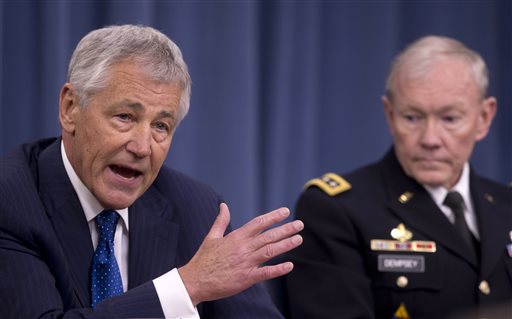(AP) Hagel, Dempsey face Congress over defense budget
By DONNA CASSATA
Associated Press
WASHINGTON
Defense Secretary Chuck Hagel and Gen. Martin Dempsey, the chairman of the Joint Chiefs of Staff, face budget-conscious lawmakers determined to cut spending but resistant to changes that President Barack Obama insists would save the military money.
Hagel and Dempsey were to testify Thursday before the House Armed Services Committee on Obama’s 2014 defense budget, a day after Obama unveiled the $526.6 billion proposal to cover the cost of buying ships, aircraft, tanks and maintaining the nation’s war fighters.
The hearing marks Hagel’s first trip back to Capitol Hill since his bruising Senate confirmation fight in February.
In a time of fiscal austerity, tea partyers and other conservatives have clamored for significant cuts in spending as the federal government grapples with a nearly $1 trillion annual deficit. Yet they’ve rejected cost-cutting changes envisioned by the Pentagon, including domestic base closings, an increase in health care fees for military retirees and the cancellation of some weapons.
The Pentagon is trying again with the new budget, seeking another round of base closings in 2015, requesting the retiree health care fee hike and proposing to terminate a version of the Global Hawk unmanned aircraft. Hagel and Dempsey are certain to find themselves on the defensive as lawmakers already have made clear that they oppose several of these moves.
In fact, the budget proposal reflects a degree of wishful thinking on the part of the Pentagon. It ignores the automatic, across-the-board budget cuts that the military is dealing with daily.
The proposal calls for a base Pentagon budget of $526.6 billion _ $52 billion more than the $475 billion level established by the spending cuts set in the budget agreement between Obama and congressional Republicans in August 2011. Fiscal conservatives have accepted the cuts as a surefire way to reduce the federal deficit, and they have shown no inclination to abandon the cuts despite the outcry of defense hawks and senior Pentagon officials who fear an erosion of U.S. military might.
The budget plan includes an $88.5 billion placeholder for additional war costs in Afghanistan as Obama decides on the pace of the drawdown of American combat troops next year and the eventual size of the residual force after December 2014. The administration likely will submit a war cost request in late April or early May.
Or, as Deputy Defense Secretary Ashton Carter said this week: “Sequester is an artificial, self-inflicted political problem, not a structural problem. Hopefully, the turmoil and gridlock will end and the U.S. can get back to normal budgeting.”
Obama’s budget reflects the end of more than a decade of conflict in Iraq and Afghanistan and the military’s strategic pivot to Asia as a nuclear North Korea increases its belligerence and China builds up its forces. After years of robust budgets, the Pentagon faces projected spending reductions totaling $487 billion over 10 years, plus tens of billions more from the automatic cuts, including $41 billion that kicked in March 1.
Instead of the across-the-board cuts of some $500 billion over 10 years, the administration is proposing $150 billion in additional defense savings over a decade, though Hagel said the reductions wouldn’t occur until “beyond fiscal 2018.”
The reductions, however, can’t alter one reality: The United States spends more on defense than the next 16 largest militaries in the world combined.
The Pentagon plan seeks congressional approval for another round of domestic military base closings, with closure decisions to be made in 2015 and implemented starting a year later. Lawmakers already have signaled that they will oppose base closures; the Pentagon budget chief, Robert Hale, told reporters he recognizes the reluctance, but “we have to keep asking” because base closures are a long-term key to saving money.
Congress has complained that the initial cost of shuttering installations is too high, despite projected long-term savings. In response, the Pentagon is seeking $2.4 billion over five years to cover the upfront expense.
Hagel called base closings a “comprehensive and fair tool” that gives communities a role in the decision-making process.
Rep. Michael Turner, R-Ohio, said another base closing round is a non-starter, pointing out that even Obama had said additional rounds were unwise.
The president’s defense proposal also calls for an increase in fees for health care, as the overall program costs around $53 billion a year and represents 10 percent of the budget. Congress, with the backing of veterans’ groups, has resisted significant changes in the fees for a program that covers nearly 10 million active duty personnel, retirees, reservists and their families.
The Congressional Budget Office estimates the cost of the program could reach $65 billion by 2017 and $95 billion by 2030.
___
Follow Donna Cassata on Twitter: http://twitter.com/DonnaCassataAP

COMMENTS
Please let us know if you're having issues with commenting.